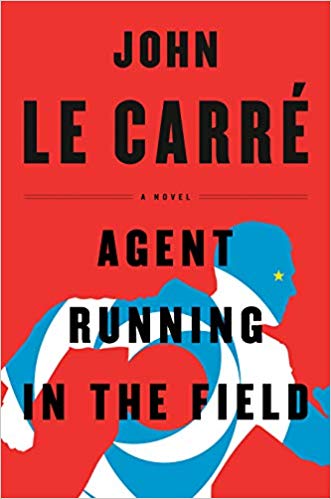
News
Summers Will Not Finish Semester of Teaching as Harvard Investigates Epstein Ties

News
Harvard College Students Report Favoring Divestment from Israel in HUA Survey

News
‘He Should Resign’: Harvard Undergrads Take Hard Line Against Summers Over Epstein Scandal

News
Harvard To Launch New Investigation Into Epstein’s Ties to Summers, Other University Affiliates

News
Harvard Students To Vote on Divestment From Israel in Inaugural HUA Election Survey
John Le Carré Wows with ‘Agent Running in the Field’
4.5 Stars
In his most recent thrilling spy novel, John Le Carré continues to impress audiences with stories of espionage, deceit, friendship, and despair. In “Agent Running in the Field,” Le Carré spins the excellent tale of an aging British intelligence agent tasked with facing down Moscow and her sleeper agents, a wife who disapproves of his role, and friends who are more than he could ever imagine. With settings from Trafalgar Square to Karlovy Vary, the story takes readers across the expanse of modern Europe and deep into the vexing political landscape that is a staple of our current times. Although similar in structure to many of his previous novels, Le Carré takes a new step with “Agent Running in the Field” through creative dialogue, intriguing characters, and a fulfilling plot.
Although enticing and thrilling in the last two-thirds, this novel’s first act progresses slowly. Spending a significant portion of the first act establishing characters and the many relationships of the protagonist, aging agent Nathaniel – Nat by his friends — pages blur together in exposition of days gone by. As a Cold War agent in Eastern Europe, Nat experienced the worst of what a field operative could experience, and with his wife by his side in Moscow — the cold beating heart of the enemy — he never forgot those days. With the many characters of Nat’s clashing personal and professional life well-established, the story makes a marked change as he is reassigned after down time to head a small, rundown compound nicknamed The Haven coordinated through the London General Office.
Once readers are immersed in The Haven, “Agent Running in the Field” begins to truly excel as a both a novel and as a point of reflection for our muddled, dishonest political sphere. As the story excites and the characters grow and develop, the literary prowess of Le Carré becomes clear. With his distinctive method of conversation, the words on the page begin drifting through the reader’s mind as Nat interacts with undercover Soviet sleeper agents or passes sweet nothings into the ears of his precious wife Prue. In the heat of the story, the keen relationship between the protagonist and his wife is well demonstrated as Le Carré writes, “One glance at my face, she rises and without a word unlocks the conservatory door to the garden.” By straying from the norm of unremarkable dialogue and delving deep into the mind and hidden reactions of Nat and the other characters, the world is seen clearly through his eyes, tinged with his experiences and vibrant memories. Because of this intriguing and simply-human method of communication and thought, Nat’s life becomes the reader’s.
Above his style, Le Carré’s use of deception as an author only adds to the intrigue of this political thrill-ride. With diverging and converging stories passing by page-to-page, the lack of connection between events remains unquestioned as this literary world is interpreted and felt through Nat’s perspective. The powerful use of gentle and eloquent foreshadowing changes the way individuals are seen. Truly, Le Carré manages to put the reader into the headspace of Nat and experience his life first-hand. Even as friends fade away and old projects rebound, the memories of these individuals and specific missions come and go as if they are the thoughts of the reader. Thinking back to the memory of one of his operatives, Nat remarks, “At sixteen he is again spotted, this time by the KGB trained as an undercover agent and tasked with the infiltration of Christian counter-revolutionary elements in northern Ossetia.” Truly, “Agent Running in the Field” shows the best of what Le Carré has cultivated over his long and successful career in spy novels.
Although the superficial plot resembles that of his other works, Le Carré provides an exciting journey like none before. The life of Nat, his colleagues, and his friends becomes that of the reader. With the expeditions across Europe and global influence accounted for, the story feels pertinent and exciting on every page. Truly, Le Carré provides an excellent story of life in the present day in his newest stunning novel, “Agent Running in the Field.”
—Staff writer Mikel J. Davies can be reached at mikel.davies@thecrimson.com.
Want to keep up with breaking news? Subscribe to our email newsletter.

